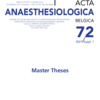Anesthesia for patients with Rett syndrome: a systematic review
Anesthesia; Rett syndrome
Published online: Apr 21 2022
Abstract
Ret syndrome a rare neurological syndrome that affects 1 in 10.000 female children. Patients with Rett syndrome receiving anesthesia are prone to develop respiratory complications.
Methods: A systematic review was conducted to critically review the available literature on Rett syndrome.
Results: Difficult airway management was found in only a minority of cases. Patients with Rett syndrome are more likely to have respiratory complications after spinal fusion surgery and have a longer mechanical ventilation time and longer postoperative ICU stay. Major respiratory events can occur even when undergoing minor procedures. Differences in nociception might exist in patients with Rett syndrome resulting in some patients with decreased analgesic requirements. Neuraxial anesthetics techniques are possible despite the high incidence of scoliosis. Patients with Rett syndrome seem to have increased sensitivity to side effects of opioids, even when administered epidurally or intrathecally. QT-prolonging drugs should be avoided due to frequent long QT-interval in patients with Rett syndrome. Succinylcholine is not recommended in Rett syndrome due to its QT-elongating effect and risk of hyperkalemia in immobilized patients. The use of a cholinesterase inhibitor and an anticholinergic drug for reversal of neuromuscular blockade is also not recommended due to its QT-elongating effect. Sugammadex, due to its negligible effect on QT-interval should be considered when reversal o
